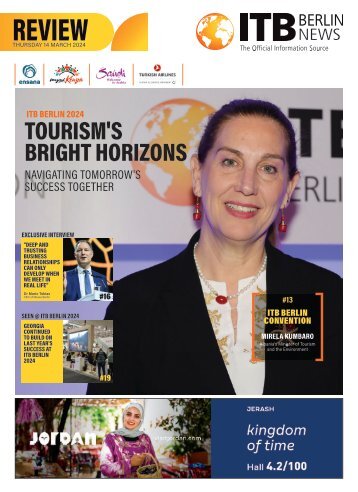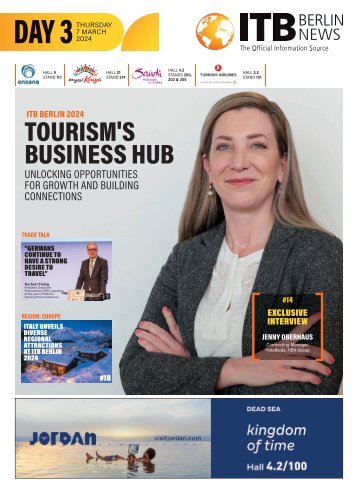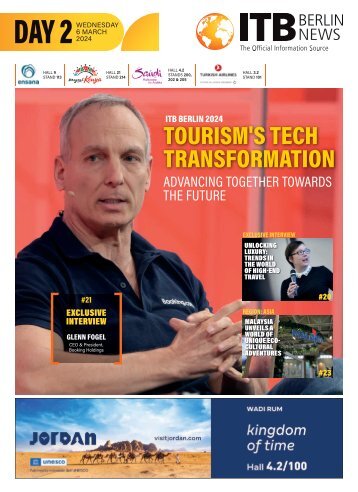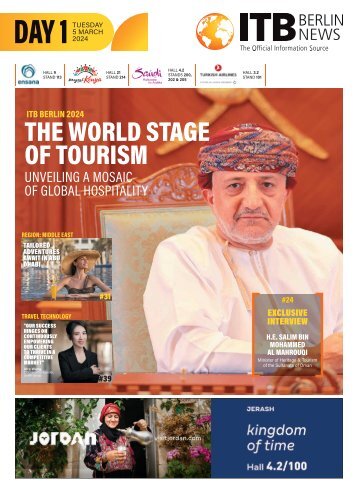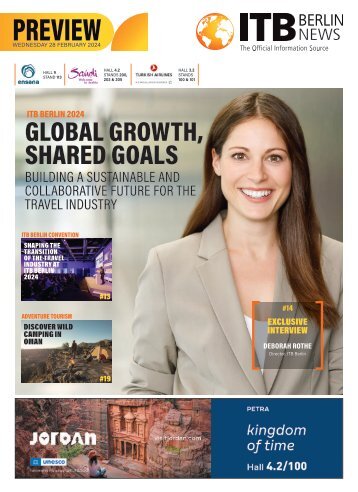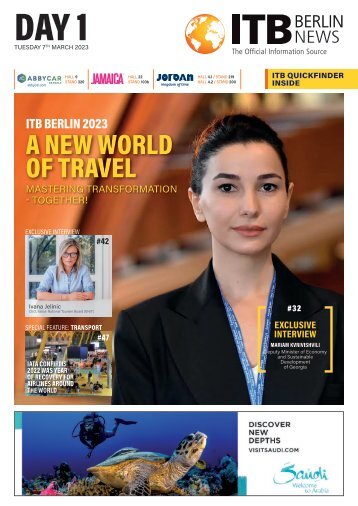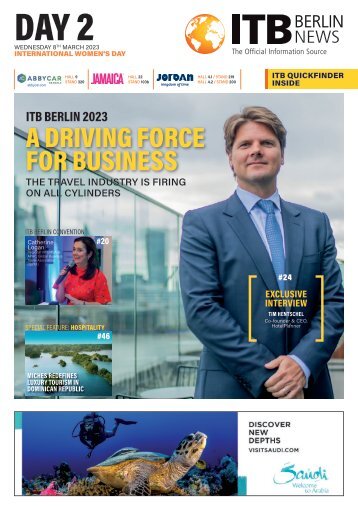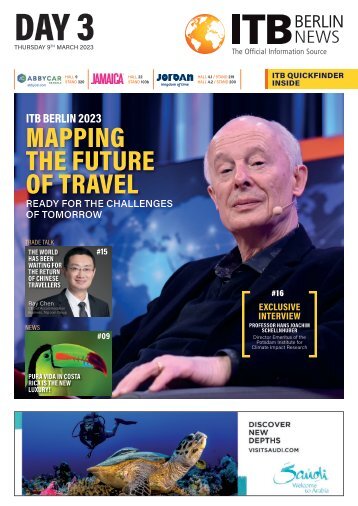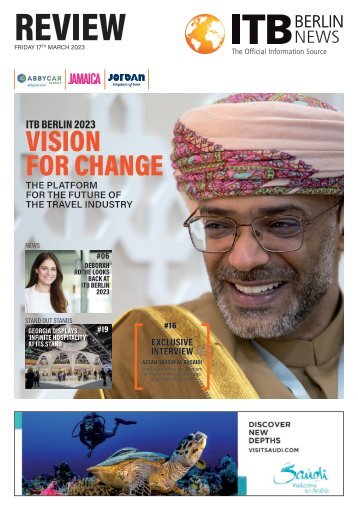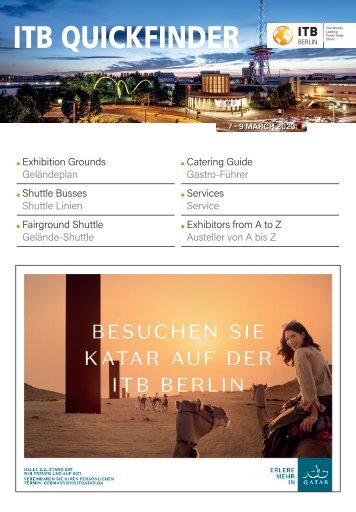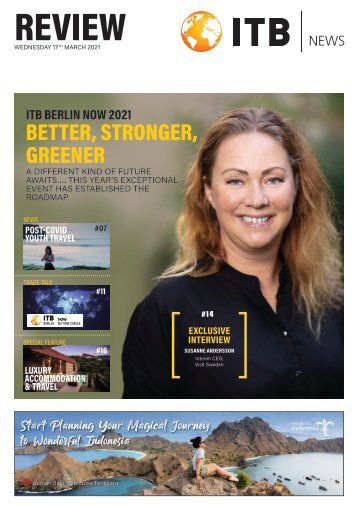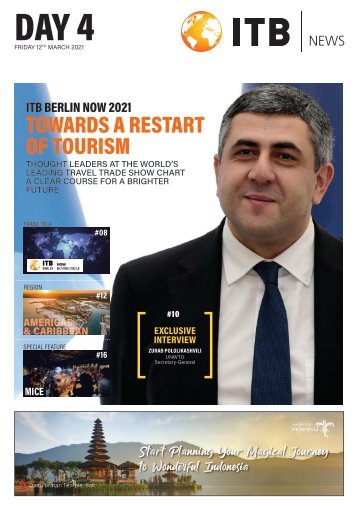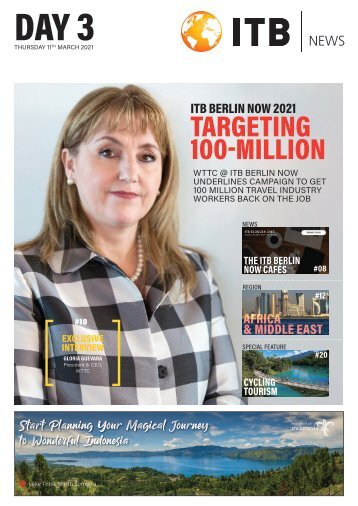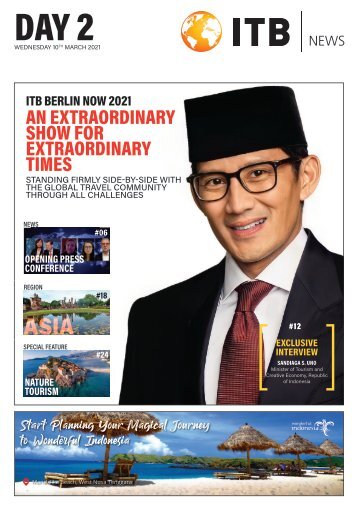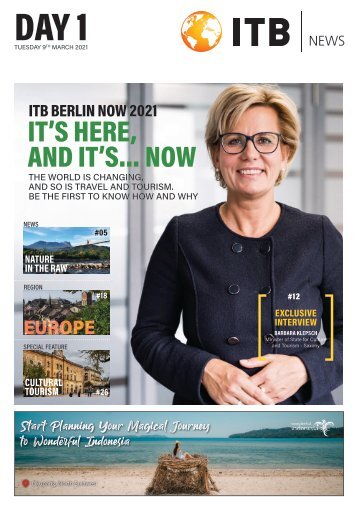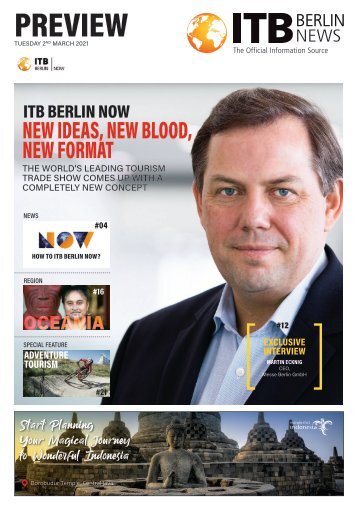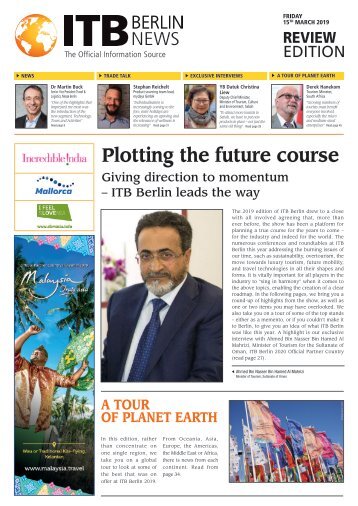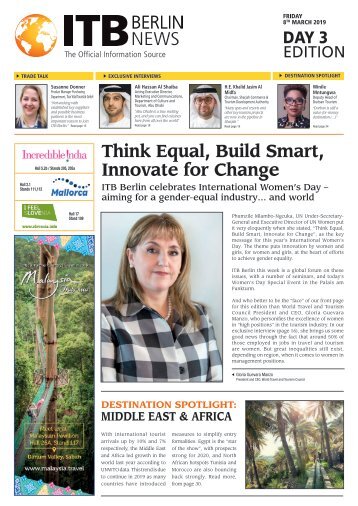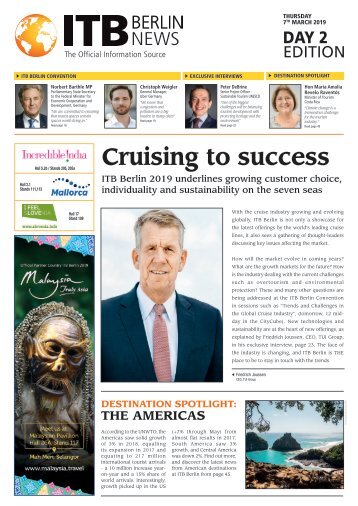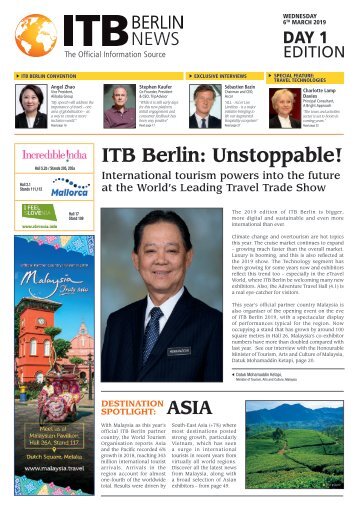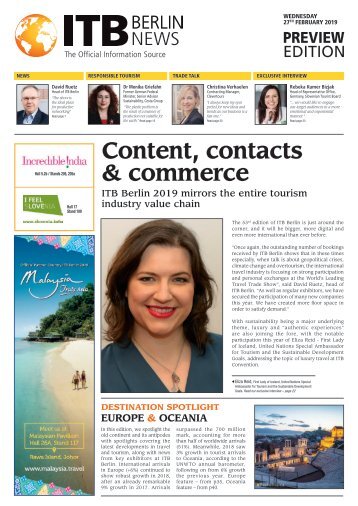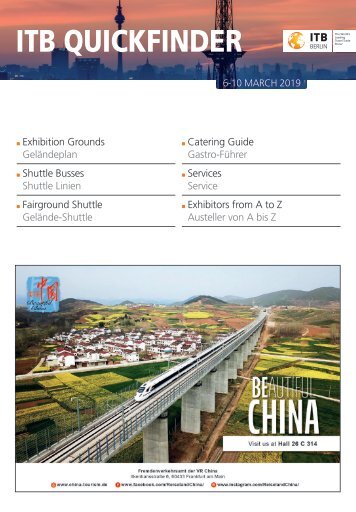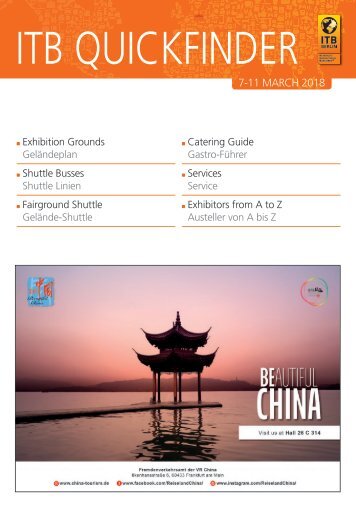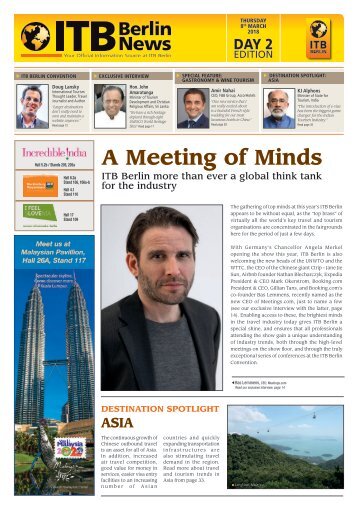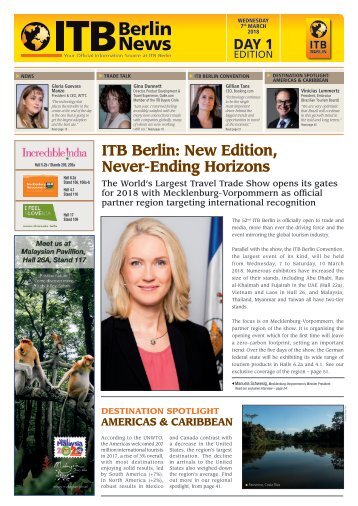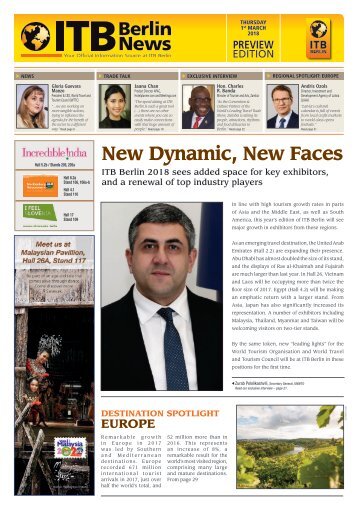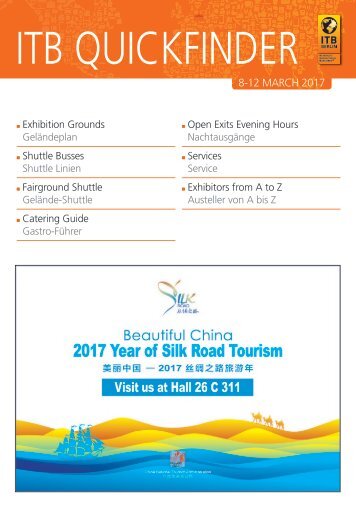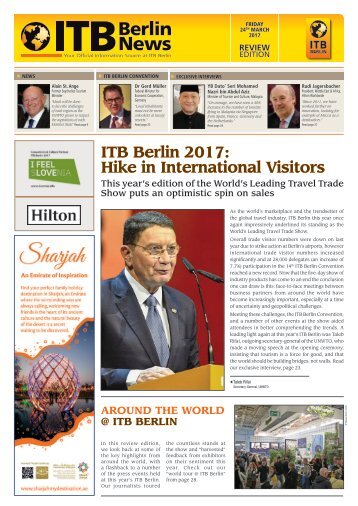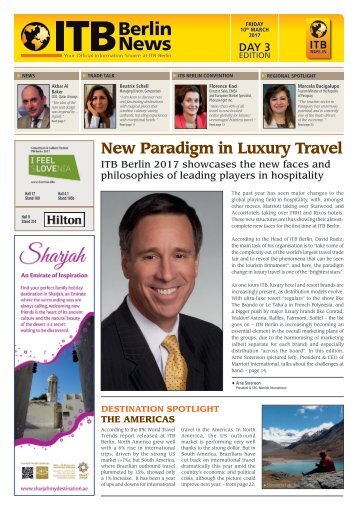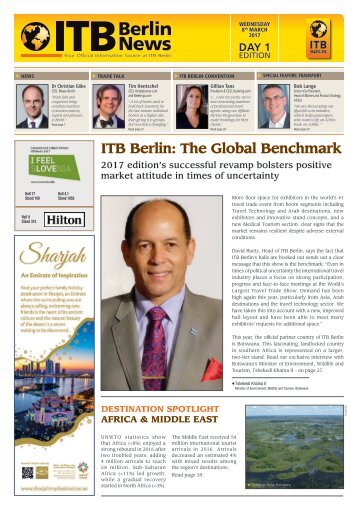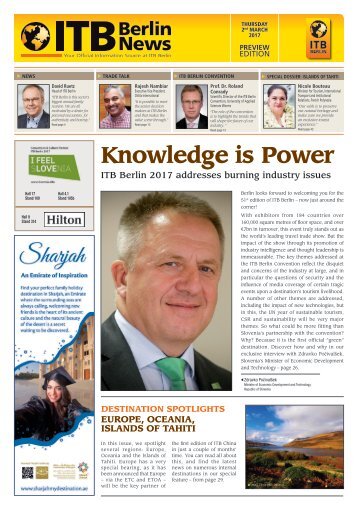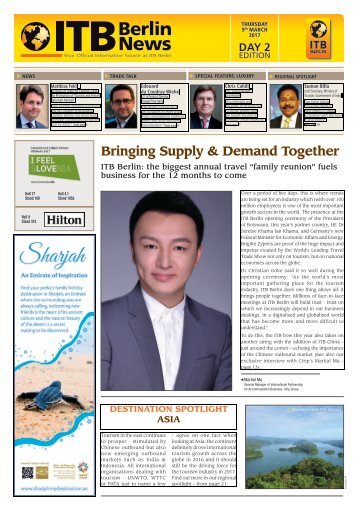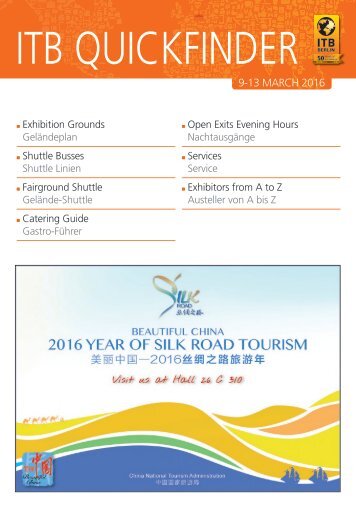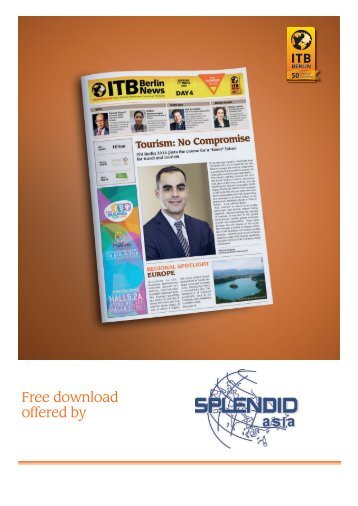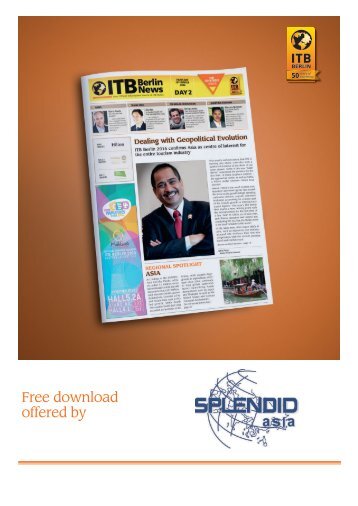
ITB Berlin News 2019 - Day 2 Edition
- Text
- Tourism
- Hotels
- Tours
- Resort
- Berlin
- Resorts
- Exhibitors
- Halle
- Tourismus
- Aussteller
- Www.cleverdis.com
22 EXCLUSIVE INTERVIEW
22 EXCLUSIVE INTERVIEW NO VISITOR WANTS TO SEE TRASH OR WORRY ABOUT THEIR HEALTH WHEN ON HOLIDAY Peter DeBrine Senior Project Officer, Sustainable Tourism at UNESCO SAME, SAME BUT DIFFERENT? – JOINT SOLUTIONS FOR SUSTAINABLE TOURISM DEVELOPMENT IN SOUTH-EAST ASIA Category: ITB Tourism for Sustainable Development Day Date: March 7, 2019 Time: 5pm - 5:45pm Location: City Cube, Auditorium A3 Balancing tourism and heritage protection At this year’s ITB Berlin Convention, Peter DeBrine, Senior Project Officer, Sustainable Tourism at UNESCO, will present joint solutions for sustainable tourism development in Southeast Asia. We asked him about the key challenges in the region. One of the biggest challenges will be balancing tourism development with protecting heritage and the environment while ensuring benefits to the local communities. Tourism infrastructure; how people move through sites; providing tourism products that reflect the heritage values without over commercialising the destinations; and ensuring broad stakeholder engagement in decision-making will be key. Bangkok is a significant city trip destination, the beaches of Bali are stunning, the temples of Angkor Wat are unique and the jewel Luang Prabang is the insider tip par excellence. Some destinations are world-famous and receive millions of tourists every year; smaller towns are just about to find their role as “global tourist destinations”. What they all have in common is that they are part of a diverse region full of cultural and natural treasures. It is therefore no wonder that tourism plays an important role for the economic development and integration of large and small countries in the ASEAN. Tourism contributes to growth and the creation of jobs, but it also generates piles of waste and social conflict, which need to be tackled. In many places, there is no infrastructure for waste disposal. Should it be up to state, regional or local authorities to fix the problem? As waste management is a complex system that typically touches all government levels, this should be an absolute priority for authorities at all levels. The tourism industry, which requires significant infrastructure development has a role in terms of investment. Government authorities can develop policies and incentives to minimise waste and maximise efficiency of collection and safe disposal. Pollution is a major turn-off for tourists. Can this fact help pressure local authorities to do more? Without question pollution is a huge negative. No visitor wants to see trash or worry about their health when on holiday. Once a bad reputation is established at a destination it is difficult to change. It is in fact everyone’s responsibility to ensure a clean and safe destination – the local authorities, the hospitality business, visitors and the local communities. Do you have any best-practice examples? Led by GIZ [the German society for international co-operation], with the support of the EU, a project in Luang Prabang called “Handle with Care” aims to address the challenges from the increasing growth of tourism by working with the local tourism industry to develop and promote sustainability. A flagship campaign focuses on reducing single-use plastic water bottles by working with local hotels, museums, cafes and restaurants to offer safe drinking water refill stations for tourists. A local NGO in India, “I Love Jaisalmer”, an alliance of local people taking responsibility for protecting their heritage, came together with hoteliers and the local tourism industry to clean up the Jaisalmer Fort, a World Heritage site in Rajasthan. By honouring the land and its people they transformed the site and significantly improved conservation and the visitor experience. Meanwhile, the Galapagos Governing Council announced a single-use plastic ban in April 2018 to protect wildlife and conserve the beauty of the islands. The ban was introduced in a phased approach, with the total ban of single-use plastics in effect by August 2018. How important is ITB Berlin in spotlighting this issue and finding solutions? ITB is an extremely important venue to discuss the critical issues. You have the entire sector engaged in some form of peer-to-peer and business-to-business networking, learning and reflecting IT IS IN FACT EVERYONE’S RESPONSIBILITY TO ENSURE A CLEAN AND SAFE DESTINATION ITB BERLIN NEWS • Thursday 7 th March 2019 www.itb-berlin-news.com
EXCLUSIVE INTERVIEW 23 WE ARE GROWING WITH TUI’S HIGH-MARGIN PRODUCTS AND SERVICES Friedrich Joussen CEO, TUI Group TUI reports growth in a “challenging environment” Over the last five years, TUI has become an integrated tourism business TUI reported record results in 2018. We asked Friedrich Joussen, CEO, TUI Group, about its performance over the year and what were the company’s main KPIs TUI had a good year in 2018, growing in a challenging environment. Turnover was up by 6.3%. For the current year 2019, we expect to repeat our record results from 2018, around €1.2bn underlying EBITA. Our transformation from a traditional tour operator and trader to a developer, investor and operator of hotels and cruise ships is paying off. We are investing in and we are growing with TUI’s high-margin products and services and our businesses are increasingly scaling. TUI is increasingly involved in cruising, but you are working on making your fleet more environmentally friendly. Please tell us more. We are well aware of our corporate responsibility. Apart from greenhouse gas emissions, TUI’s cruise companies also seek to reduce harmful air-borne pollutants such as sulphur oxides, nitrogen oxides and particles. To this end, the cruise companies continually implement both operational and technical measures. In 2018, TUI Cruises launched the new Mein Schiff 1, in February 2019 the new Mein Schiff 2 followed. TUI Cruises has one of the youngest and hence one of the most environmentally friendly cruise vessel fleets. We have ordered two additional ships for 2024 and 2026, which will run entirely on LNG. The ships of Hapag- Lloyd Cruises are also equipped with modern eco-technologies like sea water desalination systems for drinking water, biological sewage treatment, anti-fouling silicone paint and high-tech waste-toenergy plants. How are new technologies, such as Augmented Reality, coming in to play in your business? We are building digital platforms and digital platforms scale – faster and better. With data, Artificial Intelligence, algorithms and the knowledge we have about our customers, we are developing new products and services that deliver additional turnover and earnings. We have around 27 million customers, 21 million of which are in our European source markets: implementing state-of-the-art IT and intelligent customer systems for these customers generates considerable potential for new business, higher turnover and better earnings. In Palma de Mallorca we are currently testing the next generation WE HAVE ORDERED TWO ADDITIONAL SHIPS FOR 2024 AND 2026 of experiences. The trial uses Augmented Reality on excursions and activities. TUI guests are being equipped with stereoscopic augmented reality glasses which allow them to explore places individually without losing any inside knowledge. With over 50 years’ history, what does the future have in store for TUI? What does your roadmap look like? Today’s TUI is not the TUI of five years ago. The group has become an integrated tourism business, delivering considerably higher margins and being less seasonal with earnings spread evenly across the entire year. We have three growth segments which account for 70% of the Group’s underlying EBITA: Hotels & Resorts, Cruises and Destination Experiences. However, the transformation continues with future growth being created through further investments in hotels and cruise ships, but also through digitalisation. The next step will transform TUI into a digital and platform organisation: the global strength of the TUI brand, modern IT and our 27 million customers form a perfect basis for additional business and new growth. We also use Blockchain technology to manage our own hotel capacity. That optimises occupancy and improves profitability through our own yield management system. How important is ITB Berlin for TUI, and why? ITB Berlin is a very important event in particular in the calendar of TUI. With 27 million guests in more than 100 countries each year, TUI is a strong and reliable partner for destinations. We view ourselves as partners of the destinations in order to remain economically successful. ITB Berlin is the ideal place to build, maintain and foster our relationships with these destinations. We meet and talk with ministers and tourism authority representatives during the trade show. In addition, we also maintain dialogue with various other stakeholders, from media to politics ITB BERLIN NEWS • Thursday 7 th March 2019
- Page 1: THURSDAY 7 TH MARCH 2019 DAY 2 EDIT
- Page 9: BROUGHT TO YOU BY NEWS 9 ITB Berlin
- Page 12 and 13: 12 NEWS BROUGHT TO YOU BY Raffles S
- Page 15 and 16: BROUGHT TO YOU BY NEWS 15 Bernd Nef
- Page 17 and 18: RESPONSIBLE TOURISM 17 Sustainabili
- Page 19 and 20: 19 Christoph Weigler General Manage
- Page 21: EXCLUSIVE INTERVIEW 21 WE PLAY A CR
- Page 26 and 27: 26 SPECIAL FEATURE LUXURY ACCOMMODA
- Page 29 and 30: TRAVEL PRODUCT INNOVATIONS GUIDE SP
- Page 31 and 32: ADVERTORIAL SPECIAL FEATURE GASTRON
- Page 33 and 34: ADVERTORIAL SPECIAL FEATURE GASTRON
- Page 35 and 36: ADVERTORIAL SPECIAL FEATURE 35 NATU
- Page 37: SPECIAL FEATURE 37 CRUISES CRUISE H
- Page 40 and 41: 40 SPECIAL FEATURE MEDICAL TOURISM
- Page 42 and 43: 42 SPECIAL FEATURE GASTRONOMY EVENT
- Page 45 and 46: AMERICAS & CARIBBEAN REGION 45 Amer
- Page 47 and 48: AMERICAS & CARIBBEAN REGION 47 Domi
- Page 49 and 50: AMERICAS & CARIBBEAN REGION 49 COLO
- Page 51 and 52: AMERICAS & CARIBBEAN REGION 51 ADVE
- Page 53 and 54: © Thomas Keller HOSPITALITY / REST
- Page 57 and 58: ITB QUICKFINDER 6-10 MARCH 2019 Exh
- Page 59 and 60: Hall 2.2 / Stand 100 Hall 1.1 / Sta
- Page 61 and 62: CATERING GUIDE GASTRO-FÜHRER www.i
- Page 63 and 64: EXHIBITORS FROM A TO Z / AUSTELLER
- Page 65 and 66: A / B EXHIBITORS / AUSSTELLER HALL
- Page 67 and 68: B / C EXHIBITORS / AUSSTELLER HALL
- Page 69 and 70: C / D / E EXHIBITORS / AUSSTELLER H
- Page 71 and 72: E / F / G EXHIBITORS / AUSSTELLER H
- Page 73 and 74:
G / H EXHIBITORS / AUSSTELLER HALL
- Page 75 and 76:
H / I / J / K / L EXHIBITORS / AUSS
- Page 77 and 78:
L / M EXHIBITORS / AUSSTELLER HALL
- Page 79 and 80:
M / N / O / P EXHIBITORS / AUSSTELL
- Page 81 and 82:
P / Q / R / S EXHIBITORS / AUSSTELL
- Page 83 and 84:
S / T EXHIBITORS / AUSSTELLER HALL
- Page 85 and 86:
T EXHIBITORS / AUSSTELLER HALL / HA
- Page 87 and 88:
T / U / V / W EXHIBITORS / AUSSTELL
Inappropriate
Loading...
Mail this publication
Loading...
Embed
Loading...
